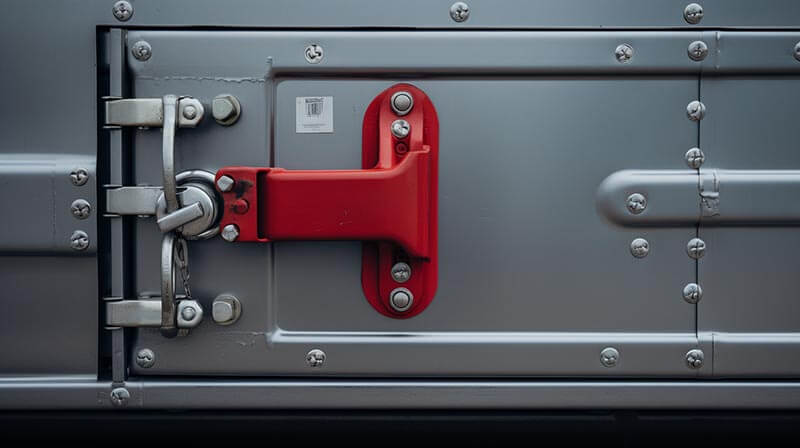

Protect Your Cargo: Essential Theft Prevention Strategies
Are you concerned about the safety and security of your cargo during transportation?
Cargo theft poses significant risks to businesses, leading to financial losses and operational disruptions. To mitigate these risks, it is crucial to implement effective theft prevention strategies.
In this article, we will explore essential strategies, such as route planning, driver training, security hardware, loaded trailer security, and cyber security.
By following these recommendations, businesses can enhance the security of their supply chain and protect their valuable goods from theft.
Key Takeaways
Route Planning and Awareness
Regularly assess high-risk areas for cargo theft and proactively avoid them by implementing effective route planning strategies. By understanding the locations where cargo theft is more prevalent, businesses can minimise the risk of becoming victims.
It is crucial to be cautious during public holiday periods and major events, as these are times when theft activities tend to increase. Planning routes that minimise risk or increase HGV security during dangerous times can significantly enhance cargo safety.
Utilising information from reliable sources to make informed route decisions is also essential. Staying updated on current trends and patterns of cargo theft enables businesses to adapt their strategies accordingly.
Driver Training and Procedures
Driver training and procedures are crucial for ensuring the security and protection of cargo during transportation. To effectively safeguard cargo, drivers need to be equipped with the knowledge and skills necessary to minimise theft risk and respond effectively to incidents. Here are three key measures that should be incorporated into driver training and procedures:
- Train drivers in proper preparation for journeys to minimise theft risk.
- Teach drivers secure cargo pick-up, delivery, and stopover procedures.
- Provide instructions on how to handle cargo theft incidents to protect safety.
Security Hardware
To enhance the security of cargo during transportation, it is essential to invest in the proper security hardware for your fleet.
Installing high-security rear door locks and air cuff locks on vehicles can significantly deter theft attempts.
Additionally, considering the use of wheel locks when leaving vehicles unattended can prevent lorry theft.
Equipping tracking devices on all vehicles allows for real-time monitoring and location identification in the event of theft.
It is also advisable to explore additional resources on preventing cargo crime to ensure fleet safety.
Prioritising the safety and security of the fleet by investing in necessary hardware is crucial for protecting valuable cargo and minimising the risk of theft.
Loaded Trailer Security
Enhancing the security of loaded trailers is crucial in protecting valuable cargo during transportation and minimising the risk of theft. To ensure the safety of your cargo, consider implementing the following strategies:
- Avoid leaving loaded vehicles unattended, especially in high-risk areas.
- Coordinate layovers with other drivers to minimise the risk of theft.
- Establish seamless communication with clients for smooth drop-offs.
By avoiding leaving loaded vehicles unattended, you reduce the opportunity for thieves to target your cargo. Coordinating layovers with other drivers adds an extra layer of security as there will always be someone present to keep an eye on the trailers.
Additionally, establishing seamless communication with clients ensures that goods are received promptly during layovers, reducing the chances of theft. By implementing these strategies, you can minimise the vulnerability of loaded trailers and protect your valuable cargo.
Cyber Security
Implementing robust cyber security measures is essential for protecting your cargo from potential cyber threats. In today’s digital age, cyber attacks are becoming increasingly sophisticated and can have devastating consequences for businesses.
To ensure the safety of your cargo and maintain a competitive advantage, it is crucial to prioritise cyber security. This involves implementing strong firewalls and spam filters, providing cyber security training to all staff members, and educating employees on identifying phishing emails and suspicious links.
Emphasise the importance of keeping sensitive information secure and password protected. By implementing comprehensive cyber security protocols, you can prevent cyber attacks and safeguard your cargo from potential theft. Stay one step ahead of cyber criminals and protect your cargo with robust cyber security measures.
| Cyber Security Measures |
|---|
| Implement strong firewalls |
| Provide cyber security training |
| Educate employees on identifying phishing emails |
| Emphasise the importance of keeping sensitive information secure |
| Implement comprehensive cyber security protocols |
Frequently Asked Questions
What Are Some Common Patterns or Tactics Used by Cargo Thieves?
Common patterns or tactics used by cargo thieves include:
- Targeting high-risk areas, such as known hotspots or areas with minimal security measures.
- Taking advantage of holidays or major events when security may be lax.
- Monitoring routes and schedules to identify vulnerable targets.
- Employing techniques such as diversionary tactics, counterfeit pickup orders, or disguising themselves as legitimate drivers.
It is important for businesses to stay informed about these patterns and implement preventive measures to protect their cargo.
How Can Companies Ensure That Their Drivers Are Following Proper Security Procedures?
Companies can ensure that their drivers are following proper security procedures by implementing thorough driver training and procedures.
This includes training drivers in preparation for journeys to minimise theft risk, teaching secure cargo pick-up, delivery, and stopover procedures, and providing instructions on how to handle cargo theft incidents.
Additionally, companies can invest in cost-effective training programs to improve overall cargo safety.
Are There Any Specific Types of Cargo That Are More Prone to Theft?
Certain types of cargo are more prone to theft due to their high value or demand in the black market. This includes electronics, pharmaceuticals, alcohol, tobacco, and high-end consumer goods. Criminals target these items because they can be easily sold and yield a high profit.
To mitigate the risk, companies should implement additional security measures such as GPS tracking, reinforced packaging, and secure storage facilities. It is crucial for companies to assess the specific vulnerabilities of their cargo and tailor theft prevention strategies accordingly.
How Can Companies Effectively Communicate With Drivers During High-Risk Periods or Dangerous Times?
During high-risk periods or dangerous times, effective communication with drivers is crucial to ensure the safety and security of cargo. Companies can utilise various methods to achieve this, such as implementing real-time communication systems, providing regular updates on potential risks and security measures, and establishing clear protocols for reporting any suspicious activities.
What Are Some Signs or Indicators That a Cyber Attack May Be Taking Place on a Company’s Systems?
Signs or indicators that a cyber attack may be taking place on a company’s systems include:
- Unusual network activity, such as a sudden increase in data traffic or slow internet speeds.
- Unauthorised access to sensitive files or systems.
- Frequent system crashes or freezes.
- Unexpected changes in system settings or configurations.
- The presence of unknown or suspicious programs or files.
Promptly identifying and addressing these indicators is crucial to mitigating the impact of a cyber attack and protecting the company’s systems and data.
Final Thoughts
Implementing effective theft prevention strategies is crucial for businesses relying on the transportation of goods.
By carefully planning routes, providing comprehensive driver training, utilising security hardware, securing loaded trailers, and implementing cyber security measures, companies can minimise the risk of cargo theft and protect their supply chain.
By taking proactive measures, businesses can ensure the safety and integrity of their valuable goods throughout the transportation process.
Our Latest Courses
Nothing Found



